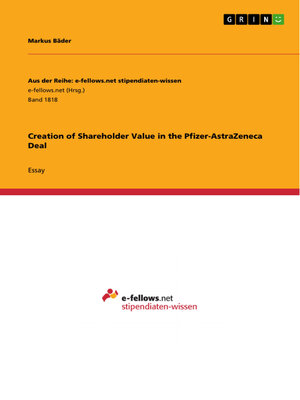Creation of Shareholder Value in the Pfizer-AstraZeneca Deal
ebook ∣ Aus der Reihe: e-fellows.net stipendiaten-wissen
By Markus Bäder

Sign up to save your library
With an OverDrive account, you can save your favorite libraries for at-a-glance information about availability. Find out more about OverDrive accounts.
Find this title in Libby, the library reading app by OverDrive.



Search for a digital library with this title
Title found at these libraries:
| Library Name | Distance |
|---|---|
| Loading... |
Essay from the year 2015 in the subject Business economics - Investment and Finance, grade: 1.0, Northumbria University (Newcastle Business School), course: International Finance and Financial Management, language: English, abstract: The pharmaceutical sector has experienced a year of heavy consolidations, with a record breaking M&A volume of $250bn in 2014. From a shareholder perspective this should, however, cause serious concern as the deals very rarely maximise the owner's wealth. An illustration of this is the failed acquisition of AstraZeneca by US pharmaceutical giant Pfizer in spring 2014, when the British, despite strong strategic synergies, decided to reject an $117bn takeover bid, due to an insufficient price-offer. This essay is going to critically evaluate the concepts of shareholder wealth creation, in light of appropriate evaluation methods for bids and the influence of capital structure. It will be concluded that information asymmetry was one of the core issues in the case, as both parties ultimately misestimated potential synergies. Moreover, it is argued that irrational decisions, made by executive, can significantly impact and eventually destroy shareholder value.







